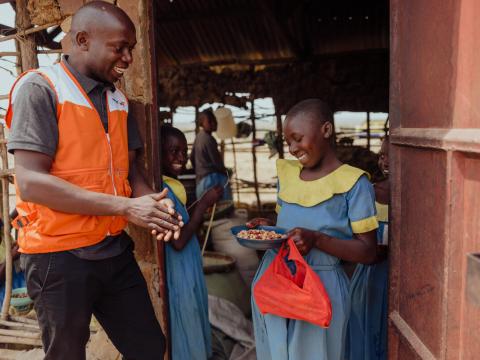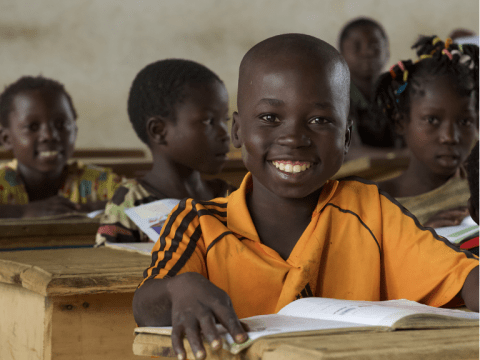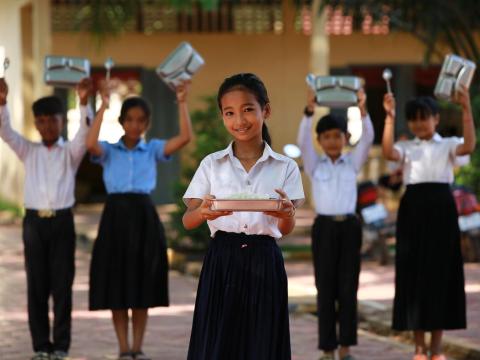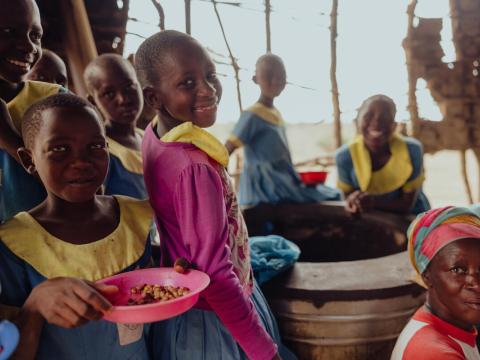
NGOs Must Focus on School Meals in Humanitarian Crises
In honour of International School Meals Day and the launch of ENOUGH campaign at the 55th Human Rights Council (HRC) in Geneva, Switzerland 14 March, Paul Kinuthia sheds light on the collaborative efforts between NGOs and Governments, exemplified by School Meals initiatives in conflict-affected regions.
With a long career in Humanitarian service, I have seen firsthand the devasting impact of natural disaster, conflict and food insecurity on vulnerable communities. But I’ve also seen the power of school meals in providing a lifeline to children in need.
I have witnessed how the humanitarian community and our own agility, resources and expertise have come together to address the multifaceted challenges that hinder access to nutritious meals for millions of children worldwide. NGOs like World Vision play a pivotal role in supporting governments in implementing school meal programmes effectively, and our extensive experience and collaborative approach have made significant impact on the lives of children and communities facing adversity.

By partnering with local communities, governments, and other stakeholders, NGOs like World Vision can tailor their interventions to suit the specific needs and contexts of each school. For instance, in conflict-affected countries like South Sudan, World Vision works closely with local authorities to ensure that school meal programmes continue despite the challenging circumstances.
By providing technical expertise, logistical support, and funding, World Vision helps governments overcome obstacles and reach vulnerable children with nutritious meals, even amid conflict. In addition to the provision of nutritious daily school meals, we are establishing school feeding management committees within the schools. Furthermore, our training courses allow us to train school administrators in leadership and communication, financial and resource management, and approaches to partnering with their communities for improved learning and accountability. Together, we are working together to ensure safe schools and inclusive education is provided.

NGOs often bring innovative approaches to the table, leveraging technology, community mobilisation, and sustainable agricultural practices to ensure the long-term success of school meal initiatives. In Angola, World Vision, World Food Programme (WFP) and partners are supporting smallholder farmers' production cooperatives to ensure they can supply requirements from the schools. In Haiti, we are working with local communities providing garden support packages to schools for establishing and maintaining school gardens. In Rwanda, World Vision partners with WFP and the United States Department of Agriculture (USDA) to implement the Home-Grown School Feeding programme. It aims to reach 145,793 students between March 2021 - September 2025. World Vision provides a suite of complementary literacy; water, sanitation, and hygiene (WASH); and Citizen Voice and Action interventions to the school meal project.

In the Democratic Republic of Congo Kasai Central, and Lomami provinces, World Vision is running School Meal programmes covering 63 schools and advocates and supports the government to create policies that promote school meals. All primary school learners receive a daily meal, and the programme includes a kitchen garden component to diversify the commodities being provided. The programme also offers deworming, nutrition education, and performance is measured through Post Distribution Monitoring and onsite monitoring.
School meal programmes have become the world’s most extensive safety net and present a powerful opportunity to transform the lives of children and their families affected by the food crisis. Every US$ 1 invested in school meals yields US$9 in economic returns, according to WFP in 2023.
Across continents, millions of children receive school meals every day, yet there remains a stark disparity in access. While some regions benefit from well-established school meal programmes, others struggle to provide even the most basic support. World Vision's commitment to partnering with governments and other stakeholders aims to bridge this gap and ensure that every child, regardless of their circumstances, has access to nutritious meals and opportunities for education.
NGOs serve as catalysts for positive change, ensuring that no child's education is compromised due to hunger, and laying the foundation for a healthier, more equitable future.
By Paul Kinuthia is World Vision's Senior Director, Technical Resources, Disaster Management Team. Learn more about World Vision's work in School Meals.
We have ENOUGH. We believe every child should have access to at least one healthy and nutritious school meal every day.
World Vision stands alongside children in calling for Governments to expand the coverage of healthy and nutritious school meals.


